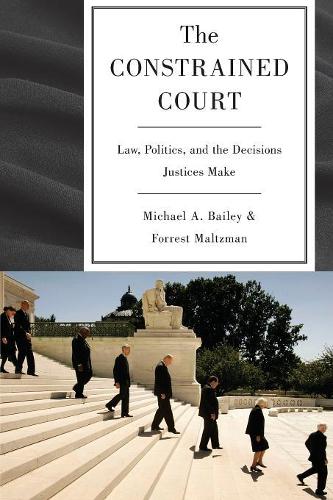
The Constrained Court: Law, Politics, and the Decisions Justices Make
(Paperback)
Publishing Details
The Constrained Court: Law, Politics, and the Decisions Justices Make
By (Author) Michael A. Bailey
By (author) Forrest Maltzman
Princeton University Press
Princeton University Press
21st November 2011
United States
Classifications
Tertiary Education
Non Fiction
347.732634
Runner-up for American Political Science Association Law and Courts Section: C. Herman Pritchett Award 2012
Physical Properties
Paperback
216
Width 152mm, Height 235mm
340g
Description
How do Supreme Court justices decide their cases Do they follow their policy preferences Or are they constrained by the law and by other political actors The Constrained Court combines new theoretical insights and extensive data analysis to show that law and politics together shape the behavior of justices on the Supreme Court. Michael Bailey and Forrest Maltzman show how two types of constraints have influenced the decision making of the modern Court. First, Bailey and Maltzman document that important legal doctrines, such as respect for precedents, have influenced every justice since 1950. The authors find considerable variation in how these doctrines affect each justice, variation due in part to the differing experiences justices have brought to the bench. Second, Bailey and Maltzman show that justices are constrained by political factors. Justices are not isolated from what happens in the legislative and executive branches, and instead respond in predictable ways to changes in the preferences of Congress and the president. The Constrained Court shatters the myth that justices are unconstrained actors who pursue their personal policy preferences at all costs. By showing how law and politics interact in the construction of American law, this book sheds new light on the unique role that the Supreme Court plays in the constitutional order.
Reviews
Honorable Mention for the 2012 C. Herman Pritchett Award, Law and Courts Section of the American Political Science Association "[I]n The Constrained Court, Michael Bailey and Forrest Maltzman have launched a frontal assault on the citadel. Their book is a tour de force that will likely supplant the attitudinal model and become a basis for a new paradigm for understanding decision making... I want to underline that is one of the most important studies in the field in the last decade. Neither Bailey nor Maltzman is a trained public law scholar, which makes it so infuriating that they have written such a path breaking study. The book should be mandatory for public law scholars and graduate students and highly recommended, as the authors suggest, for Chief Justice John Roberts."--Richard L. Pacelle, Jr., Law and Politics Book Review "The Constrained Court challenge[s] established paradigms in [its] fields, introduce[s] inventive and original research and seek[s] to transform the ways in which we think and talk about the nature of judging. It is a testament to the energy imagination, and erudition of the authors that they can legitimately take credit for having advanced these objectives."--Bruce G, Peabody, Perspectives on Politics
Author Bio
Michael A. Bailey is the Colonel William J. Walsh Professor in the Department of Government and Institute for Public Policy at Georgetown University.Forrest Maltzman is professor of political science at George Washington University. He is the author of "Competing Principals" and the coauthor of "Crafting Law on the Supreme Court" and "Advice and Dissent".
